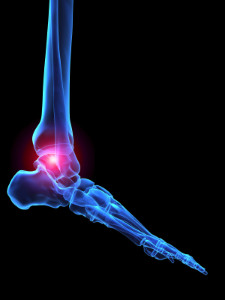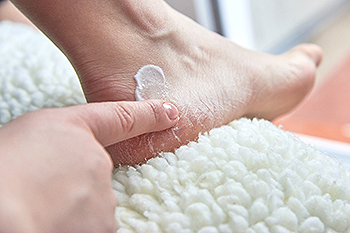
Systemic sclerosis (scleroderma), is an autoimmune rheumatic disease that causes contraction, hardening, and scar formation in the skin, tissues, joints, and even organs. Often the first areas of the body to be affected are the feet, hands, and face. When systemic sclerosis affects the feet, it can cause pain, limited mobility, an abnormal gait, deformity in the back of the foot, calcinosis under the skin’s surface, nail changes, as well as a degradation of skin in the foot. A podiatrist is an important part of the medical team that people with systemic sclerosis should consult with regularly to help them manage symptoms and prevent dangerous complications from developing—such as the development of foot wounds and ulcers. If you have been diagnosed with systemic sclerosis, make an appointment with a podiatrist to make sure you are receiving the regular foot assessment and podiatric care you need.
When dealing with systemic disease of the feet, it is extremely important to check the affected areas routinely so that any additional problems are caught quickly. If you have any concerns about your feet and ankles contact one of our podiatrists from Lovely Foot Associates, PC. Our doctors will assist you with all of your podiatric needs.
Systemic Diseases of the Feet
Systemic diseases affect the whole body, and symptoms usually are displayed in the feet. This condition can make a patient’s ability to walk unbearable. Systemic diseases include gout, diabetes mellitus, neurological disorders, and arthritis.
Gout – is caused by an excess of uric acid in the body. Common symptoms include pain, inflammation, and redness at the metatarsal/phalangeal joint of the base big toe. Gout can be treated by NSAIDs to relieve pain and inflammation, and other drugs that lower the acid levels in the body.
Diabetes mellitus – is an increase in the level of blood sugar that the body cannot counteract with its own insulin. Failure to produce enough insulin is a factor in Diabetes.
Diabetes of the Feet
Diabetic Neuropathy – may lead to damaged nerves and affect the feet through numbness and loss of sensation.
Peripheral Vascular Disease – can restrict the blood flow to the feet, and often times lead to amputation of the feet.
If you have any questions please feel free to contact our office located in Johnstown, PA . We offer the newest diagnostic and treatment technologies for all your foot and ankle needs.
Swollen legs, ankles and feet are common for most women when they are expecting a baby. A buildup of fluid, an increase in weight, hot weather, gravity, and standing for long periods are contributing factors. Swelling (edema) during pregnancy usually gets worse in the last trimester and right after birth. One way to avoid some of the swelling is by eating healthy foods, including fish, lean meats, poultry and lots of fresh fruit and vegetables. In addition, try to reduce the amount of salt, fats and sugar, and especially processed foods, that you consume. Plus, it’s a good idea to drink plenty of water to flush the system. Try to stay off your feet and keep them elevated, particularly later in the day. Do ankle rolls and foot flexes to increase blood flow to the feet. If swelling becomes severe and moves up the calf, or if pressing on your ankle or leg leaves an indentation, it may be a sign of something more serious. It is suggested that you see a podiatrist immediately who can examine the feet and ankles properly and recommend treatment options.
Pregnant women with swollen feet can be treated with a variety of different methods that are readily available. For more information about other cures for swollen feet during pregnancy, consult with one of our podiatrists from Lovely Foot Associates, PC. Our doctors will attend to all of your foot and ankle needs.
What Foot Problems Can Arise During Pregnancy?
One problem that can occur is overpronation, which occurs when the arch of the foot flattens and tends to roll inward. This can cause pain and discomfort in your heels while you’re walking or even just standing up, trying to support your baby.
Another problem is edema, or swelling in the extremities. This often affects the feet during pregnancy but tends to occur in the later stages.
How Can I Keep My Feet Healthy During Pregnancy?
If you have any questions please feel free to contact our office located in Johnstown, PA . We offer the newest diagnostic and treatment technologies for all your foot and ankle needs.
A broken foot is typically quite painful. If a broken foot is suspected, removing footwear and elevating the foot above heart level is usually recommended. Check your foot and body for any other injuries that might also require immediate attention. Then you must consult with a podiatrist to have an X-ray taken. This imaging is necessary to determine if you have broken your foot, as well as the severity of the break. The podiatrist will likely create a splint for the foot, provide you with crutches, and instruct you to stay off the affected foot as much as possible so that it can heal. Once an appropriate amount of time has passed, the podiatrist will evaluate your foot again to see how the healing has progressed. They may even provide a prescription for physical therapy so that you can regain full functionality of the foot.
A broken foot requires immediate medical attention and treatment. If you need your feet checked, contact one of our podiatrists from Lovely Foot Associates, PC. Our doctors can provide the care you need to keep you pain-free and on your feet.
Broken Foot Causes, Symptoms, and Treatment
A broken foot is caused by one of the bones in the foot typically breaking when bended, crushed, or stretched beyond its natural capabilities. Usually the location of the fracture indicates how the break occurred, whether it was through an object, fall, or any other type of injury.
Common Symptoms of Broken Feet:
Those that suspect they have a broken foot shoot seek urgent medical attention where a medical professional could diagnose the severity.
Treatment for broken bones varies depending on the cause, severity and location. Some will require the use of splints, casts or crutches while others could even involve surgery to repair the broken bones. Personal care includes the use of ice and keeping the foot stabilized and elevated.
If you have any questions please feel free to contact our office located in Johnstown, PA . We offer the newest diagnostic and treatment technologies for all your foot and ankle needs.
 Severely cracked heels are referred to as heel fissures. They are defined as cracked skin that appears on the heels, and they can often cause pain and discomfort. This condition can occur for several reasons, including being overweight, wearing shoes that have an open back, or standing for the majority of the day. Additionally, medical conditions consisting of psoriasis or eczema may contribute to the development of cracked heels. It is helpful to wash and dry the feet thoroughly, followed by applying a good moisturizer. Cracked heels can be an unsightly, uncomfortable nuisance, and it is strongly suggested that you consult with a podiatrist if this condition is affecting you.
Severely cracked heels are referred to as heel fissures. They are defined as cracked skin that appears on the heels, and they can often cause pain and discomfort. This condition can occur for several reasons, including being overweight, wearing shoes that have an open back, or standing for the majority of the day. Additionally, medical conditions consisting of psoriasis or eczema may contribute to the development of cracked heels. It is helpful to wash and dry the feet thoroughly, followed by applying a good moisturizer. Cracked heels can be an unsightly, uncomfortable nuisance, and it is strongly suggested that you consult with a podiatrist if this condition is affecting you.
Cracked heels are unsightly and can cause further damage to your shoes and feet. If you have any concerns, contact one of our podiatrists from Lovely Foot Associates, PC. Our doctors can provide the care you need to keep you pain-free and on your feet.
Cracked Heels
Cracked heels appear unappealing and can make it harder for you walk around in sandals. Aside from looking unpleasant, cracked heels can also tear stockings, socks, and wear out your shoes. There are several methods to help restore a cracked heel and prevent further damage.
How Do You Get Them?
Dry skin is the number one culprit in creating cracked heels. Many athletes, walkers, joggers, and even swimmers suffer from cracked heels. Age and skin oil production play a role to getting cracked heels as well.
Promote Healing
Over the counter medicines can help, especially for those that need instant relief or who suffer from chronic dry feet.
Wear Socks – Wearing socks with medicated creams helps lock in moisture.
Moisturizers – Applying both day and night will help alleviate dryness which causes cracking.
Pumice Stones – These exfoliate and remove dead skin, which allows for smoother moisturizer application and better absorption into the skin.
Change in Diet
Eating healthy with a well-balanced diet will give the skin a fresh and radiant look. Your body responds to the kinds of food you ingest. Omega-3 fatty acids and zinc supplements can also revitalize skin tissue.
Most importantly, seek professional help if unsure how to proceed in treating cracked heels. A podiatrist will help you with any questions or information needed.
If you have any questions, please feel free to contact our office located in Johnstown, PA . We offer the newest diagnostic and treatment technologies for all your foot care needs.